![]()

Campbell Collaboration Crime and Justice Group
The COPS Office and the Campbell Collaboration Crime and Justice Coordinating Group (CCJG) is pleased to continue our partnership to bring the latest research on effective crime and justice practice to law enforcement, practitioners, and other stakeholders in the field.
The CCJG is one of six coordinating groups within an international network of researchers that voluntarily produce systematic reviews. A systematic review sums up the best available evidence on a specific question by synthesizing the results of several rigorous studies. This methodology uses transparent procedures to find, evaluate, and synthesize the results of relevant research. Each review must have:
- Clear inclusion/exclusion criteria for studies
- An explicit search strategy
- Systematic coding and analysis of included studies
- Meta-analysis (where possible)
To ensure the highest quality, each Campbell systematic review is peer reviewed by content and methodology experts. For more information about the Campbell Collaboration systematic review, refer to http://www.campbellcollaboration.org/what_is_a_systematic_review/index.shtml.
The COPS Office and CCJG have partnered together to offer abbreviated versions of these systematic reviews, formatted specifically for law enforcement, practitioners, and other stakeholders in the field.
Links
Current publications
 |
Crime Prevention Reviews No. 1: Disrupting Street Level Drug Markets - This report summarizes the findings from rigorous academic studies evaluating a range of street-level drug law enforcement interventions. It finds that strategic crime-control partnerships with a range of third parties are more effective at disrupting drug problems than law enforcement-only approaches. |
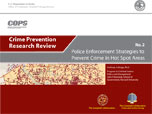 |
Crime Prevention Research Review No. 2: Police Enforcement Strategies to Prevent Crime in Hot Spot Areas - The second publication in the Crime Prevention Research Review series, this report summarizes the findings from rigorous academic studies evaluating police enforcement strategies in hot spot areas. It finds that focusing efforts on places with high crime and calls for service can effectively be used to prevent crime in those locations. Reduced calls for service and other reductions in crime and disorder measures were noted in most studies. There was no evidence of crime displacement due to the enforcement efforts in those studies that measured displacement. |
 |
Crime Prevention Research Reviews No. 3: Does Neighborhood Watch Reduce Crime? - The third publication in the Crime Prevention Research Review series, this report summarizes the findings from rigorous academic studies evaluating Neighborhood Watch. The meta-analysis finds that Neighborhood Watch is associated with a reduction in crime. The analysis is based on very few studies due to the lack of randomized experiments in evaluating Neighborhood Watch. Policy implications include recommending more experimental evaluations of Neighborhood Watch and encouraging police to utilize programs like Neighborhood Watch that work best in their local area. |
 |
Crime Prevention Research Review No. 4: The Effects of Problem-Oriented Policing on Crime and Disorder - Problem-oriented policing (POP) has diffused quickly since Herman Goldstein’s original conception in 1979. Today, more than two-thirds of large police departments utilize POP. This review synthesizes the extant literature on problem-oriented policing to determine whether this widely adopted innovation is effective in reducing crime and disorder. An exhaustive literature review uncovered 10 studies with rigorous research designs, which show that in general, POP does help reduce crime. The small number of studies prevented additional efforts to contextualize this finding, but a further examination of pre/post evaluations of problem-oriented policing indicate this program has much promise. |
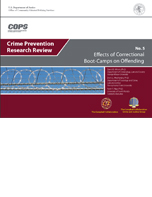 |
Crime Prevention Research Review No. 5: Effects of Correctional Boot-Camps on Offending - Correctional boot-camps provide judges and prosecutors with an intermediate sentencing options. Although boot-camps differ substantial in the programming provided, participants in the typical boot camp are required to follow a rigorous daily schedule of activities including drill and ceremony and physical training, similar to that of a military boot-camp. Punishment for misbehavior is immediate and swift and usually involves some type of physical activity like push-ups. This publication summarizes the findings from a systematic review of the evidence on the effectiveness of correctional boot-camps. Across the 43 evaluations, the overall results suggest that boot-camps are less effective at reducing recidivism relative to more traditional sentencing options. Boot-camps with a stronger treatment focus had slightly more positive outcomes. Overall, it appears that boot-camps are not an effective correctional approach. |
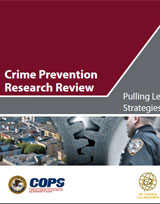 |
Crime Prevention Research Review No. 6: Pulling Levers Focused Deterrence Strategies to Prevent Crime - Pulling levers focused deterrence strategies are increasingly being used by police departments to prevent and control violence, overt drug markets, and individual repeat offenders. Given the growing popularity of pulling levers programs, a careful review of the existing evaluation evidence is needed to determine the crime reduction benefits of the approach. |
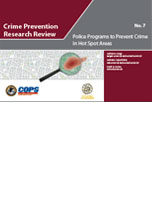 |
Crime Prevention Research Review No. 7: Police Programs to Prevent Crime in Hot Spot Areas - The seventh publication in the Crime Prevention Research Review series, Police Programs to Prevent Crime in Hot Spots Areas provides a review of the findings from all rigorous academic studies evaluating these types of police programs. This review builds upon the information originally presented in the second publication in this series, Police Enforcement Strategies to Prevent Crime in Hot Spot Areas, and finds that focusing efforts on places with high crime and calls for service can effectively prevent crime in those locations. Reduced calls for service and other reductions in crime and disorder measures were noted in most studies. Displacement of crime due to the enforcement efforts was not prevalent in those studies that measured displacement. Hot spots policing programs were more likely to produce a diffusion of crime control benefits into areas immediately surrounding targeted hot spot areas. |
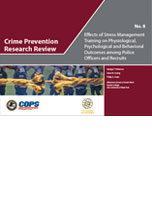 |
Crime Prevention Research Review No. 8: Effects of Stress Management Training on Physiological, Psychological and Behavioral Outcomes among Police Officers and Recruits - Stressful work and life events have the potential to affect police officers and recruits physiological, psychological, and behavioral wellbeing negatively. As such, studies have examined the effects of stress management training in these areas. Law enforcement organizations provide a variety of stress management interventions aimed at helping officers to cope with these stressful events. The purpose of this systematic review was to examine the evidence assessing the efficacy of these interventions. Using a variety of methods to search literature over a 10 month period between August 1, 2009 and May 31, 2012, the researchers located 678 titles and abstracts. Upon further screening to include only randomized controlled trials or quasi-experimental designs, the researchers focused on 12 primary studies in a meta-analysis. Results show that the stress management interventions were neither effective nor ineffective. |

